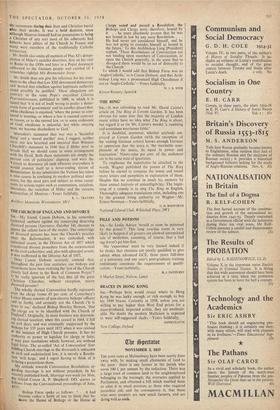THE CHURCH OF ENGLAND AND DIVORCE SIR.—My friend, Canon Dobson,
in his somewhat hysterical outburst against my remarrying deserving divorced persons (Spectator, October 14), chooses to ignore the salient facts of the matter. The remarriage of divorced persons has been the Church's practice since the Reformation; it was embodied, with episcopal assent, in the Divorce Act of 1857 which transferred divorce procedure from the ecclesiastical to the civil authorities; and, also with episcopal assent, was reaffirmed in the Divorce Act of 1937.
Does Canon Dobson seriously contend that, throughout the past four centuries, our bishops and incumbents have been violating the `law of the Church toady laid down in the Book of Common Prayer"? Is he really ignorant of the fact, that all the great Christian Churches, without exception, marry divorced persons? The wholly clerical Convocation hardly represents even the clergy (some 45 per cent. of Canterbury's LoVver House consists of non-elective bishops' officers and so forth), and certainly not the Church (`lt is news to me,' declared Bishop Hensley Henson, 'that the clergy are to be identified with the Church of England). Originally, its main business was determin- ing clerical taxation; when this ceased in 1664, it fell on evil days, and was eveotually suppressed by the bishops for 135 years until 1872 when it was revived
at the instance of High Church pressure. It has no authority or power to legislate for clergy or laity; it may pass resolutions which, however, are without legal force. The so-called 'Act of Convocation' (for- bidding Church marriage to the divorced) is unknown to civil and ecclesiastical law; it is merely a Resolu- tion 'writ large,' and I regret having to think of it as being a pretentious sham. My attitude towards Convocation Resolutions re- garding marriage is not without precedent. In his
recently published book, Marriage was made for Man, 121y friend Canon A. P. Shepherd, DD, quotes as
follows from the Convocational proceedings of June, 1935 Bishop Furse spoke as follows : e. . it had become rather a habit of late to think that be- Cause the House of Bishops or the House of
Clergy voted and passed a Resolution, the Bishops and Clergy were, therefore, bound by it . . he must absolutely protest that he was not bound in law by any mere Resolution.. . He had never yet considered himself, and he was not going to consider himself so bound in the future.' To this Archbishop Lang [President] replied, 'These Resolutions of Convocation are not binding upon members 'of Convocation, or upon the Church generally, in the sense that to disregard them would be an act of disloyalty to the Church.'
To which I would add that Bishop Furse was an 'Anglo-Catholic,' as is Canon Dobson; and that Arch- bishop Lang was a pronounced High Churchman if not an 'Anglo-Catholic.'—Yours faithfully,


































 Previous page
Previous page